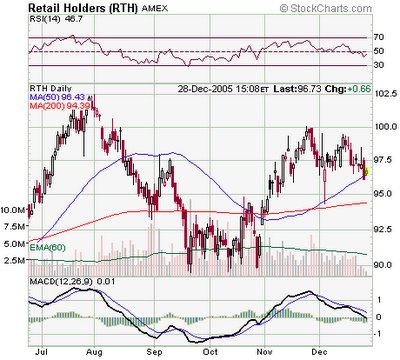
In the fall the S&p fell from 1240 to 1170 on the Fed inflation and tightening scare. In November the third quarter GDP coming in at 3.8% put to rest fears that hurricanes, energy costs and the Fed had harmed the economy and we ran from 1170 to 1270. From there, for the last five weeks we sit between 1250-1275. Volume is low and nothing substantial appears to be going on. Underneath the surface however, change is taking place. Yesterday's 100 point plunge was a dailykey reversal and may become a weekly. The bank index BKX, that led the Nov rally looks like it may be rolling over as RSI is dropping. Housing continues to soften as the MBA mortgage application survey showed today by dropping further. From 95 to 2000 it was the internet driving the economy, from 2000 to 2005 housing has driven the economy. The market trades as if people are more interested in protecting this years profits than marking them higher. Christmas was no blowout and earnings warning season is not far away. Retail reports are due next week and the chart of the RTH doesn't look too good. It's a good time to be careful and maybe put out some shorts. Happy New Year.







